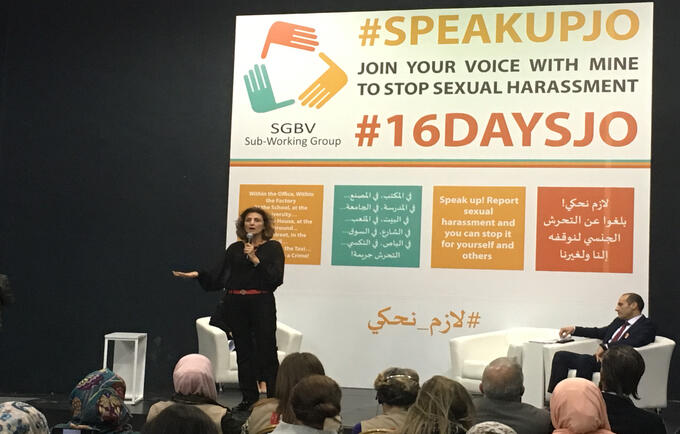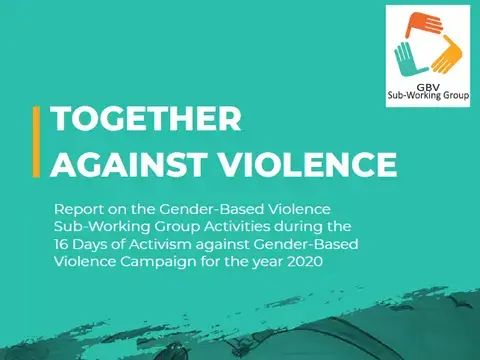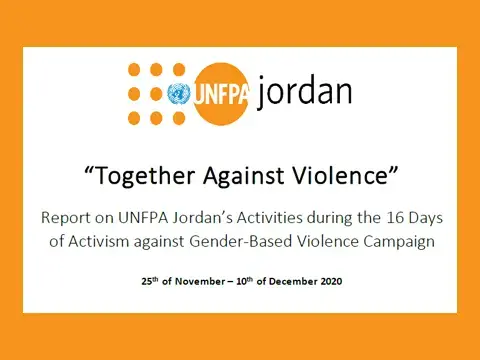On 29 November 2018, the Sexual and Gender-Based Violence Sub-Working Group (SGBV SWG) organized a joint event at Ras Al Ain Hangar to celebrate collective efforts to prevent and respond to gender-based violence in Jordan on the occasion of the 16 Days of Activism Against Gender-based Violence campaign. Featuring the work of twenty-two national and international organizations, including United Nations agencies, entities and funds, this is the first initiative of its kind organized in Jordan to shed light on protection services provided to survivors of violence.
“Every individual has a role to play,” said the UN Resident and Humanitarian Coordinator, Mr. Anders Pederson. “We can speak up against harassment taking place. We can advocate for listening to the voices of girls and women who are experiencing harassment. We can advocate for reporting. We can stand up as men against sexual harassment and hold perpetrators accountable.”
The fair’s slogan was “Speak up: Join your voice to mine to stop sexual harassment”. The theme is aligned with the national campaign led by the Jordanian National Commission for Women (JNCW) and the Shama’a Network, in collaboration with the United Nations. In addition to the UN Resident and Humanitarian Coordinator, Mr. Anders Pedersen, the opening ceremony included remarks by Dr. Salma Nims, Secretary General of JNCW, and Dr. Ibrahim Aqel, Director of Institute for Family Health.
“I want to bust the myth that harassment doesn’t exist. No, it does exist,” said the Secretary General of the Jordanian National Commission for Women, Dr. Salma Nims. “Our study shows that 75.9 percent of the sample, which was 86 percent female and 14 percent male, were exposed to harassment at one point in their life.”
“It is every female citizen’s, every female tourist’s and every female guest’s right not to be harassed when she moves around in any place in the country,” said the Director of the Institute for Health at the Noor Al Hussein Foundation, Dr. Ibrahim Aqel. “It is within our right, all of us today, to raise our voices and to say, no, we are not going to stay quiet to this subject after this.”
UNFPA and UNHCR, as co-chairs of the SGBV SWG, emphasized the importance of individuals’ actions in creating change through joint awareness-raising efforts and by educating others on the existence of sexual harassment. The event advocated for the rights of survivors of violence, including amplifying their voices, mobilizing the general public against gender-based violence, holding perpetrators accountable, as well as ensuring access to specialized services and reporting mechanisms. The event also featured the testimony of a young Syrian refugee woman on her experience of empowerment and speaking up.
Open to the public, the fair was visited by more than 300 people and included booths showcasing participating organizations’ work on gender-based violence, art activities, self-defense classes, theater, a video screening and a bazaar featuring food items and handicrafts made by local women’s organizations. In addition to the public, guests included government stakeholders, donor agencies, and humanitarian and development actors.
About the 16 Days of Activism Against Gender-Based Violence Campaign
From 25 November, the International Day for the Elimination of Violence against Women, to 10 December, Human Rights Day, the 16 Days of Activism Against Gender-Based Violence Campaign is a time to galvanize action to end violence against women and girls. The 16 Days of Activism, under the leadership of the UN Secretary General, António Guterres, the United Nations Secretary-General’s UNiTE to End Violence against Women Campaign (UNiTE), calls for global action to increase awareness, galvanize advocacy efforts and share knowledge and innovations.
About the Sexual and Gender-Based Violence (SGBV) Sub-Working Group
The Sexual and Gender-Based Violence Sub-Working Group (SGBV SWG) is a coordinating body with the objective to strengthen SGBV prevention and response in emergency settings. It works to facilitate multi-sector, inter-agency action aimed at prevention of SGBV, and to ensure a principled approach to the provision of accessible, prompt, confidential and appropriate services to survivors of SGBV. The SGBV SWG’s focus is Syrian refugees in urban contexts, camps and other collective centers and also includes other populations affected by the emergency. The SGBV SWG develops and implements the SGBV strategy within the broader protection strategy for Jordan, and ensures, in coordination with the Community-Based Protection Working Group, the integration of SGBV in the multi-sector response. The SGBV SWG, co-led by UNFPA and UNHCR, coordinates with national coordination bodies and structures providing protection services under the Jordan Response Plan to the Syria crisis 2018-2020. It currently comprises more than 40 national and international organizations providing SGBV prevention and response services.





